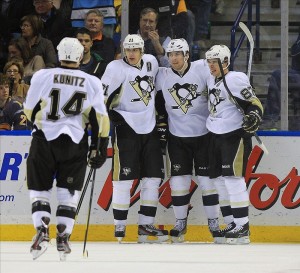One short week ago, the Pittsburgh Penguins found themselves sitting atop the Metropolitan Division with a sparkling 7-1 record. Today, the club still maintains that position in the standings but the Pens have dropped three in a row, a setback that hasn’t occurred in the regular season since a six game skid that stretched from December 29, 2011 to January 11, 2012.
Why the sudden reversal of fortune? It’s easy to blame the tumultuous week on running into hot goaltenders, late-game meltdowns or the fact that the offense dried up when the big guns went quiet (Sidney Crosby and Evgeni Malkin combined for two points in the three contests). But the biggest culprit behind this tough stretch? Special teams play.
The Power Play

Even without injured forwards James Neal and Beau Bennett, the Penguins boast one of the most talented power play units in the NHL. After all, anytime a squad can throw Crosby, Malkin, Kris Letang and Chris Kunitz on the ice together, enough skill jumps over the boards to strike fear in the hearts of almost any opponent. And, for the first eight games of the season, the group (admittedly minus Letang) was lethal.
During this skid, though, nothing appears to be going right for a unit that can’t buy a break. From missing the net to hitting goaltenders to just not simplifying things and getting more pucks on the cage, the Penguins haven’t been able to break through. In fact, presented with 15 opportunities, the club produced a single power play tally last week. And, while it dropped the team to 16th (20%) on the circuit in power play efficiency, the drought more importantly cost the team some valuable points in the standings.
Take, for instance, both the Colorado and Toronto matchups:
Colorado at Pittsburgh
Perhaps the most discouraging game of the skid came in a contest that originally appeared to be nothing more than “one of those nights”. Because, in a matchup of 7-1 teams, Pittsburgh largely dominated play against the Avalanche, outshooting Colorado 34-14.
And, yet, the game’s lone marker came courtesy of Gabriel Landeskog, fresh out of the box following Colorado’s fifth successful penalty kill of the night. The visitors would go on to survive thanks in large part to Jean-Sebastien Giguere. The goaltender stood on his head en route to recording an improbable shutout of a Pittsburgh team that clearly dictated the play, created chance after chance and, ultimately, failed to capitalize on any of the seven man advantages the squad was afforded.
At the time, the frustrating setback seemed to represent nothing more than a night in which the bounces didn’t go the Penguins’ way. In hindsight, though, it was the start of a three game stretch that saw the Pens’ power play dry up as the team potted just four goals.
Pittsburgh at Toronto
It seemed the funk may have been short-lived when the Pens squared off against the Maple Leafs on Saturday night. With Letang embracing the need to spray the net with more rubber, the Penguins’ first power play opportunity culminated with the Norris Trophy-finalist’s first marker of the season:
Unfortunately for Pittsburgh fans, though, the power play looked lethargic and disorganized from that point on as the Pens failed to convert on their final two opportunities. More alarming, an improbable save that kept Malkin off the board immediately sprung a quick Toronto transition, resulting in a game-tying, short-handed goal. While the Penguins survived the immediate shift in momentum, the tally represented another special teams’ breakdown that contributed the squad’s third loss in a row.
The Penalty Kill
Pittsburgh’s penalty killing (25th in the league) has, without question, left something to be desired throughout the first few weeks of the season. Without past short-handed stalwarts Matt Cooke and Jordan Staal, the unit is reeling early in the 2013-’14 campaign. And, while the effort hasn’t necessarily lagged further during the past three games, the group’s inability to kill penalties at key moments has certainly contributed to the overall lack of success.
Specifically, the last two games have seen the Pens’ short-handed unit come up, well, short:
New York Islanders at Pittsburgh

Though not as damaging as what would occur the next night in Toronto (how’s that for foreshadowing?), the penalty killing against the Islanders proved unsuccessful. In fact, the Pens surrendered a marker on New York’s only power play opportunity of the game.
Though it occurred early in the contest, Matt Moulson’s power play tally immediately followed yet another missed man advantage opportunity for the Penguins. And, aside from the momentum it provided New York with in the first period, the strike ultimately won the special teams battle for an Islanders squad that shut out the Penguins’ power play before walking out of Pittsburgh with a one goal victory. Was Moulson’s marker ultimately the difference? Perhaps not but it exemplified what an uphill climb typically awaits any club that struggles with their special teams.
Pittsburgh at Toronto
Much like the Pens’ power play effort in Toronto, the penalty killing effort started off successfully as the unit killed the first two opportunities against. But the group betrayed the club when the Penguins most needed a successful kill; trailing 2-1 late in the third period, Pittsburgh would need to survive one last Leafs’ power play if the visitors were going to have any chance of forcing overtime. Instead, Phil Kessel was inexplicably left alone at the side of the cage and, in a flash, found the puck on his stick and became the beneficiary of a slam dunk play, erasing virtually any hope of a dramatic comeback.
That tally marked yet another lost special teams battle for the Penguins and, along with it, another missed opportunity to pick up any points in the standings.
Time to Panic in Pittsburgh?
In today’s social media driven, now, now, now society, it’s easy to look at this skid and think the Penguins could be in trouble. And, to be frank, the penalty killing (or lack thereof) does represent a troublesome trend to this point in the season, particularly if Rob Scuderi’s injury keeps the blue liner out for any significant amount of time.
However, it’s only a three game stretch in a long season. The Pens are going to have rough patches but this club possesses too much talent to be held down for long. What’s more, the eventual return of both Neal and Bennett will further bolster a lineup that already possesses more skill than most NHL squads.
Yes, it’s been a rough week but the Penguins will find their way out of this funk, a way to get back on track. They have too much talent and too much pride not to.